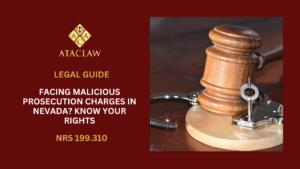In the ever-evolving world of law, one accusation can have far-reaching implications. One such critical yet often misunderstood area is malicious prosecution under NRS 199.310. This Nevada law mandates that intentionally striving to prosecute an innocent person with malice, and lacking probable cause, represents a serious crime, with potential punishments varying from a misdemeanor to a felony.

What Does Malicious Prosecution Mean in Nevada?
In Nevada, the term “malicious prosecution” carries with it a weighty implication. As outlined by Nevada statute NRS 199.310, malicious prosecution occurs when an individual, driven by malice and devoid of any reasonable grounds, orchestrates or attempts to orchestrate the arrest or prosecution of someone who is, in actuality, innocent of the crime they are being accused of.
To put it another way, it’s a violation of Nevada law to initiate legal actions against another person, accusing them of a crime, when there’s no substantial evidence or belief of their guilt. Such charges of malicious prosecution are frequently encountered following disputes that escalate to allegations of battery or domestic violence.
The cornerstone of a malicious prosecution claim is the presence of ill intent, or malice, coupled with a complete lack of justifiable cause. This means that the accuser did not have any reasonable basis to believe the accused was actually guilty of the crime in question. The essence of malicious prosecution is not just about wrongfully accusing someone; it’s about doing so with harmful intent and without any legitimate reason.
This offense is taken seriously within Nevada’s legal framework due to the significant impact such accusations can have on an individual’s life. Being wrongfully accused can lead to unnecessary legal battles, tarnish reputations, inflict emotional distress, and even result in wrongful incarceration. Hence, the law aims to protect individuals from being unjustly targeted by baseless legal actions.
How Can You Effectively Contest Malicious Prosecution Claims in Nevada?
Facing charges under NRS 199.310 for malicious prosecution in Nevada can be daunting. The law is strict, and the outcomes of such cases can significantly affect one’s life and reputation. However, several defense strategies can be employed, depending on the circumstances surrounding the accusation. Here’s an insightful look into common defenses your lawyer might consider to counteract these charges effectively:
1. Demonstrating the Absence of Malice
A fundamental element of a malicious prosecution charge is the presence of malice behind the accusation. If you can prove that your actions were driven by genuine concern rather than malintent, aiming for the public’s safety or well-being, this could invalidate the basis for the charge. Showing that your intentions were rooted in goodwill and not in causing harm can be a critical defense.
2. Establishing Probable Cause
Legally, making a report to law enforcement is warranted if there’s probable cause to believe a crime has been committed. If your defense can successfully argue that your actions were based on a reasonable suspicion supported by facts or evidence, rather than on unfounded allegations, the merits of a malicious prosecution charge could quickly dissolve.
3. Validating the Accusation with Proof of Guilt
Ironically, the best defense against a malicious prosecution claim might be the guilt of the accused party. If the person you reported is eventually charged and convicted of the crime, it fundamentally undermines the premise of the malicious prosecution accusation. While awaiting the outcome of ongoing legal proceedings might stretch the timeline, a conviction would decisively vindicate your actions.
4. Highlighting Insufficiencies in the Prosecution’s Evidence
In every criminal proceeding, the burden of proof lies with the prosecution, which must illustrate the defendant’s guilt beyond a reasonable doubt. A skilled defense attorney can dissect the prosecution’s case piece by piece, exposing weaknesses, inaccuracies, or gaps in the evidence. Casting doubt on the reliability or sufficiency of the evidence can prompt the dismissal of charges if the prosecution fails to meet its burden of proof.
What Are the Legal Consequences for Malicious Prosecution?
Malicious prosecution penalties largely depend on the seriousness of the wrongfully attributed crime. If you falsely accuse someone of a felony, you could face a category D felony in Nevada, which carries potential jail time and fines:
a. 1 – 4 years in Nevada State Prison
b. Up to $5,000 in fines
For minor false allegations (gross misdemeanor or misdemeanor), you could be charged with a misdemeanor in Nevada, which carries:
a. Up to 6 months in jail
b. Up to $1,000 in fines
Remember, the accuser may also sue you in a civil court for damages, including compensatory and punitive damages. Be aware of the harsh legal consequences and potential civil liabilities if you’re facing a malicious prosecution charge. Consult a proficient attorney for help navigating your case within the Nevada legal landscape.
For further legal assistance and to discuss your case with an expert, don’t hesitate to contact ATAC LAW.
